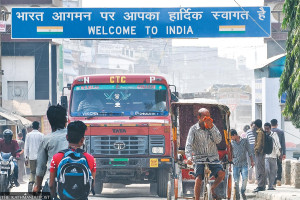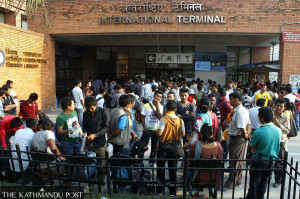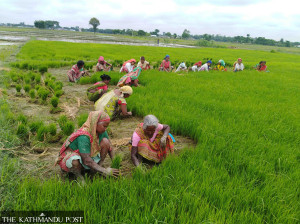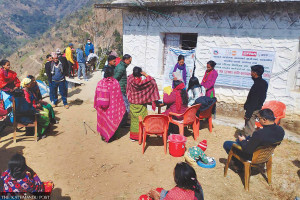 16.12°C Kathmandu
16.12°C KathmanduMoney
Nepali farmers reap bonus on India’s rice export ban
Though rice mills have been offering higher prices to buy paddy from Nepali farmers, for consumers it’s bad news.
Shankar Acharya
The state-owned food trading company’s office in Birgunj is struggling to buy paddy due to local traders and rice mills offering higher prices to farmers this year following India’s ban on rice exports.
The office of the Food Management and Trading Company in Birgunj said it had issued a notice to procure paddy from farmers in the first week of December, but so far no one has come forward to sell their produce.
"This is the first time in history that we were unsuccessful in purchasing paddy from sellers,” said Pankaj Kumar Jha, branch manager of the company.
The company normally purchases paddy and supplies rice to several prisons in the eastern and central Tarai regions.
“We have been supplying small quantities of rice sources from other sectors to the prisons.”
The office supplies 80 to 90 tonnes of rice to the prisons in Birgunj, Gaur, Bhimphedi, and Bharatpur every month.
According to him, they have a contract to supply 35 tonnes of rice to the Birgunj prison, 20 tonnes to Bhimphedi prison, 95 tonnes to Gaur prison and 25 tonnes to Bharatpur prison, each month.
He said that all three offices in Lahan, Janakpur, and Birgunj in the Madhesh province have been unable to purchase rice.
“The Lahan branch collected rice in a small quantity, but procurement in Janakpur and Birgunj branches were unsuccessful.”
“We have no rice stock in all branches of Madhesh province,” he said.
The company also procures paddy from its offices in Nepalgunj, Surkhet, Biratnagar, Dang, Gorkha, Pokhara, Bimalnagar, Bhairahawa, and Dhangadhi.
He said that as the private sector or the rice mills have offered higher prices for paddy, farmers are unwilling to sell their produce to the company.
Traders say that the price of Mansuli, the common variety of rice, has soared following the ban on rice export by India.
Last fiscal year, the office purchased Mansuli paddy at Rs31.28 per kg.
This fiscal year, farmers were offered an extra Rs2.34 per kg.
The federal government has set the minimum support price for Mansuli paddy at Rs33.62 per kg for this year’s harvest.
The local purchase committee has fixed the price for Jira Mansuli paddy at Rs35 per kg this fiscal year.
The Indian government granted Nepal a quota of 95,000 tonnes of rice after imposing a ban on the export of non-basmati rice, but has imposed a slew of restrictive measures alongside the permission, Nepali rice importers say.
On October 18, the Indian government permitted the export of 95,000 tonnes of non-basmati white rice to Nepal, following the sweeping export ban on July 20.
Under the new arrangement, each Nepali private importer has been allowed to bring in up to 5,000 tonnes of rice on a first come, first served basis, by agreeing on price and quality.
However, Nepali traders say that along with the export quota, India has imposed a 20 percent export duty, which makes rice expensive in Nepal.
Vibhor Agrawal, a member of the Association of Nepalese Rice, Oil and Pulses Industries, told the Post in a recent interview that apart from 20 percent export duty on rice, there is a requirement to make 100 percent advance payment to the Indian company to import rice.
The imposition of the export duty will make rice dearer by Rs300 to Rs400 per 25kg bag in the Nepali market, traders say.
Due to the higher import costs, rice mills have started to offer higher prices for Nepali farmers to buy the local produce. But traders say that it’s bad news for inflation-hit consumers as rice would become more expensive.
The Food Management and Trading Company’s head office in Kathmandu has given approval to the Birgunj branch to purchase 4,200 tonnes of paddy this fiscal year, including 3,700 tonnes of Mansuli rice and 500 tonnes of Jira Mansuli.
Last fiscal year, the Birgunj branch was allowed to purchase 1,480 tonnes of paddy.
The price of Mansuli paddy has reached Rs41 per kg in the local market and traders say it may reach up to Rs46 per kg soon.
Traditionally, the prices of paddy on the Nepal-India borders are based on the Indian market.
However, due to the export ban on non-basmati rice imposed by India, rice mills are suffering and have turned to local producers to meet their demands.
Despite the El Niño phenomenon, Nepali farmers are expected to harvest a record 5.72 million tonnes of paddy this fiscal year.
While government officials say that Nepal will no longer need to import rice from India due to the bumper harvest, rice traders say varieties which Nepal’s urban consumers eat are normally not produced inside the country.



















